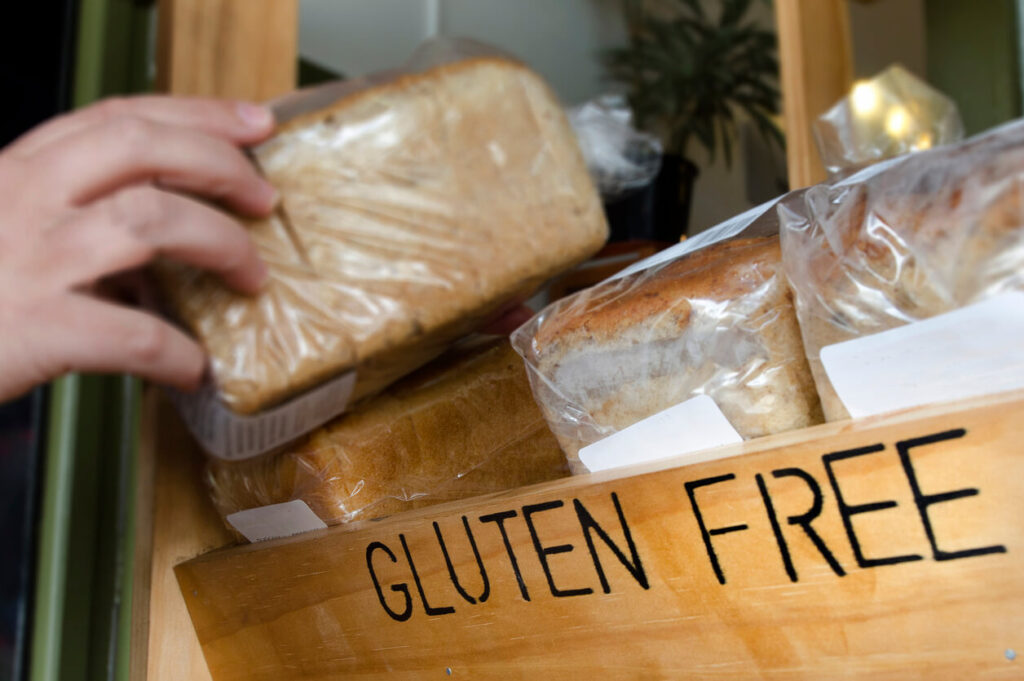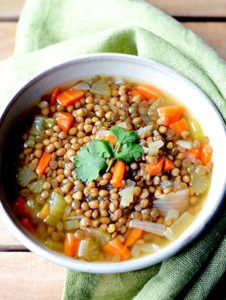Gluten-Free Diets Are Harmful for the General Population (Except for One Percent)

Is gluten really that bad for you? The short answer: No. The longer answer is that gluten is only bad for those with Celiac disease or gluten sensitivity.
The current gluten-free diet craze is unhealthy for those who do not need it. In search of weight loss or feeling better, millions of Americans risk becoming sicker and fatter by increasing their intake of gluten-free products.
A survey found that between July and August 2022, 27% of survey participants were gluten-free. Only 4% were completely gluten-free for medical reasons, while 10% limited their gluten consumption for medical reasons. The remaining 13% was gluten-free for non-medical reasons.
Is Gluten Really That Bad For You?
As mentioned before, gluten isn’t actually bad unless you have a medical problem. Gluten is a protein found in certain grains, and while it’s a natural protein, some food products will add more to enhance flavor or texture.
People think gluten is bad for them because your body can’t completely break down gluten—leaving some of it undigested. Undigested gluten goes to the small intestine and, for the most part, doesn’t cause a problem. Those with specific medical conditions can react to undigested gluten.
Some people feel better when they stop eating gluten, even without a medical condition, but that could be due to cutting out processed food more than the gluten itself.
3 Reasons People May Need Gluten-Free Diets
Gluten can be bad for you if you have one of these three medical conditions.
1. Celiac Disease
Celiac disease is a hereditary autoimmune disease where gluten consumption causes the immune system to attack the small intestine lining. Gluten damage to the intestinal barrier creates a “leaky gut.” Now, “foreign proteins” from microbes and food are indiscriminately allowed to pass through the intestinal wall, causing all kinds of trouble.
The resulting malabsorption prevents the small intestine from efficiently absorbing necessary nutrients—diarrhea, abdominal pain, flatulence, weakness, and weight loss are common symptoms.
People with untreated Celiac disease have an increased risk of developing lymphomas and a greater risk of suffering from autoimmune diseases—such as type 1 diabetes and thyroiditis (leading to hypothyroidism).
The definitive diagnosis of celiac disease is made by a bowel biopsy showing damage to the intestinal lining (villous atrophy). Blood tests (endomysial and tissue transglutaminase antibodies) help support the diagnosis. The cornerstone of treatment is lifelong adherence to a strictly gluten-free diet.
2. Wheat Allergies
Different from celiac, a wheat allergy is just like any other kind of allergy. A person can have an allergic reaction when consuming or inhaling wheat. They will share common allergy symptoms of:
- A swollen or itchy mouth or throat
- Anaphylaxis
- Diarrhea
- Difficulty breathing
- Headache
- Hives
- Nasal congestion
You can find out if you have a wheat allergy through the typical skin or blood test.
3.Gluten Sensitivity
This form of gluten intolerance is diagnosed when both celiac disease and wheat allergy have been excluded. Symptoms include:
- Abdominal discomfort
- Bloating
- Brain fog
- Depression
- Diarrhea
- Fatigue
- Headaches
- Joint pain
- Muscle cramps
- Numbness
- Pain
- Skin rash
While there’s still a lot of research regarding the difference between gluten intolerance and celiac, it has been shown that in some cases, people with sensitivity got sick after being reintroduced to gluten.
However, at the same time, some studies have shown that people with gluten sensitivity improved through a low-FODMAP diet. FODMAP stands for Fermentable Oligosaccharides, Disaccharides, Monosaccharides, and Polyols—certain types of carbohydrates. So, it’s possible people are simply sick from their unhealthful diet of meat, dairy foods, vegetable oils and other junk food.
Gluten-Free Diets Are Not Weight Loss Plans
The national best-selling book Wheat Belly by William Davis, MD, has fueled the current rage of questioning if gluten is really that bad for you. The book’s subtitle is “Lose the Wheat, Lose the Weight, and Find Your Path Back to Health.”
Misquoting the research and ignoring the bulk of the scientific evidence, Dr. Davis has convinced people that avoiding wheat is the solution to America’s obesity and health crises. Within the book, Dr. Davis says, “Modern wheat is a perfect chronic poison; it causes diabetes, it causes inflammation, it causes heart disease, it causes high blood pressure….” In a CBS News interview, he claims that the elimination of wheat will cure these conditions and cause people to stop their medications.
Although I applaud Dr. Davis for bringing problems with wheat to greater public awareness, I consider this fad of using a gluten-free diet as a weight loss method a serious diversion away from what I believe to be the real solution to obesity and common diseases.
Traditionally, high-carbohydrate eating has been people’s diet throughout recordable human history. Many of these ancient and modern civilizations have relied on generous amounts of wheat, barley and rye for survival.
While emphasizing the benefits of a wheat-free diet, Dr. Davis clarifies his alliance with the low-carb movement, typified by the popular Paleo and Atkins diets. He recommends people eat unlimited amounts of eggs, full-fat cheese, other dairy products, meat, fish, chicken and vegetable (olive) oils.
He also suggests reducing or eliminating favorite (even non-gluten) “comfort foods,” like corn, rice, oats, quinoa, millet, buckwheat, potatoes and beans.
I conclude that Dr. Davis’s prescription for filling the dinner table with rich foods, once reserved for the tables of wealthy kings and queens, is actually one of the causes of the current epidemics of obesity and common illnesses in the developed world, not the solution.
The AACC International (formerly the American Association of Cereal Chemists), a global nonprofit organization of 2,500-grain scientists studying the chemistry of cereal grains, also disagrees with Dr. Davis. They’ve responded with a scientific analysis of a few of his claims.
Gluten-Free Diets Can Cause Weight Gain
Patients with celiac disease usually suffer from malnourishment because of the problems created by damage to their intestines from gluten. Following the removal of the wheat, barley, and rye, the GI tract heals, and only then are calories and other nutrients efficiently assimilated.
Weight gain is the desired and expected result for underweight people with celiac disease. However, some people with documented celiac disease are overweight and even obese before starting a gluten-free diet.
You might expect that the dietary restrictions imposed by a strict gluten-free protocol alone would cause weight loss for them. Unfortunately, weight gain is common in adults and children with celiac disease who go on gluten-free diets.
A 2012 study of 1018 patients with biopsy-confirmed celiac disease found significant weight gain. Around 16% of patients moved from a normal or low BMI (body mass index) class into an overweight BMI class, and 22% of overweight patients gained weight at the time of diagnosis after starting their strict gluten-free diet.
Let me be more to the point for the growing masses looking for the answer: There are no published reports showing that a gluten-free diet produces weight loss in persons without celiac disease or gluten sensitivity.
The primary reason for unwanted weight gain in people buying gluten-free products is that these imitations often contain more calories, fat, and sugar. The casual observer can see the folly in eating gluten-free cakes, cookies, and pies and expecting weight loss and better health.
A trip through your local health food store or supermarket reveals rows of desserts where the wheat has been replaced with another grain (flour), and fats, vegetable oils, simple sugars, dairy products, and eggs are abundant on the ingredient lists.
Percent of Fat Calories from Popular Gluten-Free Foods
Here are a few examples of the amount of fat in some gluten-free foods according to Bowes & Church’s Food Values of Portions Commonly Used (19th Edition) by Ph.D. Jean A. T. Pennington and Judith Spungen.
- Falafel–71%
- Cheese Pizza–36%
- Brownies–38%
- Cupcakes–37%
- Chocolate Cake–38%
- Chocolate Chip Cookies–50%
These foods can also contain:
- Dairy products
- Eggs
- Free vegetable oils
- Nuts
- Refined flours,
- Saturated fats
- Simple sugars
- Soy
Why You Need Expert Knowledge about Gluten-Free Diets
When a dietitian, knowledgeable about proper food choices for a healthy gluten-free diet, is involved in patient care, weight loss is accomplished.
In one study, overweight and obese patients were advised to choose a high-quality gluten-free diet with naturally gluten-free foods (fruits and vegetables) and alternate non-gluten grains (quinoa and buckwheat). These properly counseled patients consistently lost excess weight. There is, unfortunately, a scarcity of dietitians and medical doctors available for the proper management of celiac disease.
This Fad Ultimately Harms Many Celiac Patients
If you are among the few people with celiac disease or potential sensitivity, avoiding gluten is crucial to your health. You cannot cheat!
With the popularity of using a gluten-free diet as a weight loss method, the importance of this dietary restriction for the truly needy is diminished. Restaurant waiters become used to customers asking for “gluten-free dishes” and then failing to object when a few whole wheat bread crumbs appear as a decoration on top of their potato soup.
Since wheat, barley, and rye did not cause apparent distress in the previous 99 customers, the waiters and chefs think, “It can’t be all that important.”
But it is for that one percent.
Dr. McDougall’s Recommendations
If you suspect you have celiac disease, get tested by your physician—avoiding gluten foods is a lifelong restriction. If you are unsure about your diagnosis but still suspect gluten,go on a starch-based diet with no wheat, barley, or rye.
For example, you can base your diet on rice, corn, sweet potatoes, white potatoes, and beans, with fruits and green and yellow vegetables. The connection between gluten and celiac disease is so close that the diagnosis can often be made when the patient experiences dramatic improvement of symptoms upon following a gluten-free diet. Confirmation of your diagnosis can be made by carefully adding back any suspected foods.
If you, like two-thirds of adults in the US, are sick and overweight and without celiac disease, wheat allergy, or wheat sensitivity, I strongly recommend including these good starches—wheat, barley, and rye—in your diet. These foods are known to cause desirable weight loss and medical benefits.
McDougall Foods Acceptable for Celiac Disease
If you do have celiac, here’s a list of food that’s safe for you to eat.
Grains
- Amaranth
- Buckwheat (or kasha)
- Corn
- Job’s tears
- Millet
- Quinoa
- Rice
- Sorghum
- Teff
- Wild rice
- Oats*
Other Foods
- All fruits
- All green, yellow, and orange vegetables
- All legumes**:Beans (including soy and chickpeas), peas and lentils
- Root vegetables: Potatoes, yams, sweet potatoes and cassava-root (tapioca)
* Oats have been demonstrated in multiple studies to be free of toxic proteins and can be tolerated by most, but not all, people with celiac disease. Still, there is worry that commercial oat products may be contaminated with wheat.
**Legumes create extra gas, sometimes causing bloating and bowel discomfort. This reaction may be confused with symptoms of celiac disease and wheat sensitivity.
Recommended Articles

Mary's Mini-McDougall Diet® - Answers to Common Questions

Making the Change to a Healthy Lifestyle Work, Part 1 - Why Change?






